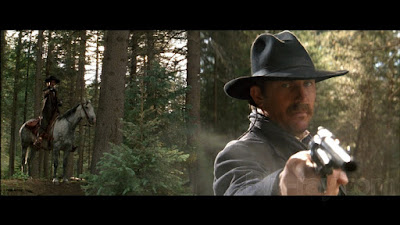Wyatt Earp was released in 1994. It is directed by Lawrence Kasden and written by Kasdan and Dan Gordon. It chronicles the life of Earp (Kevin Costner), from his childhood in Pella, Iowa to his days as a U.S. Marshall in Tombstone, Arizona where his involvement in a feud with an outlaw band leads to the now famous gunfight at the O.K. Corral.
The story behind the making of Wyatt Earp is almost more interesting then the film itself. Kevin Costner was originally slated to play the Earp in the film Tombstone, but disagreed with screenwriter Kevin Jarre about the direction of the story. Costner wanted the film to be more focused on his character and ultimately left the project. He then went to Lawrence Kasden (Raiders of the Lost Ark, Silverado) who wrote a script for a biopic about Earp. Worried about the potential competition from Tombstone, he used his, at the time, considerable influence in Hollywood to convince most major studios not to distribute the film (it was ultimately released under Disney's Buena Vista subsidiary). Kasdan had intended Wyatt Earp to be a tv miniseries, but Costner's involvement meant that it would be made for the big screen. In retrospect it probably would have worked out better as a miniseries.
Wyatt Earp is overly ambitious. It attempts to condense nearly 30 years of Wyatt Earp's life into a 3 hour movie and, as a result, it feels really truncated at times. We see Wyatt Earp meet Doc Holiday (Dennis Quaid), but the incident that really brought them together, namely Holiday saving Wyatt's life in Dodge city, is omitted. In general, some scenes are omitted or pass by far too quickly while others linger on for far too long. Despite this I still quite liked the film.
Wyatt Earp is easily the most historically accurate film about the man. Eschewing the romanticized mythologizing of John Ford's My Darling Clementine, the more loose, character driven approach of John Sturgis' Gunfight at the O.K. Coral, and the action driven Hollywood glitz of Tombstone, Kasden, Costner and Gordon set out to make a true biopic which would explore the man behind the legend. Costner's Earp is a broken man. Loosing his first wife Urilla (Annebeth Gish) shatters his world, leading him to become a drunken reprobate. Given a second chance by his father (Gene Hackman) he first becomes a buffalo skinner and then a lawman "the only thing that (he's) any good at". He's a hard man. One who won't hesitate to shoot first and ask questions later. He tells Ed Masterton (Bill Pullman), "This is a harsh land, Ed. It doesn't suffer fools." Family means everything to Wyatt, and he and his brothers share a bond that goes far beyond friendship. This devotion to family also means that the death of Urilla left a hole in Wyatt's heart that never really healed. He takes in a prostitute named Mattie Blaylock (Mare Winningham) as a common-law wife but he doesn't really love her. It's only when he meets Josie Marcus (Joanna Going) that he is able to find some measure of peace, and even then he must first contend with the murder of his brother Morgan (Linden Ashby).
Costner does a decent job in the titular role, though his performance is perhaps, a little too subdued at times. Dennis Quad is pretty much perfect as Doc Holiday, bringing the right blend of charm and pathos to the role. Gene Hackman is great, as always, as Nicholas Earp. Micheal Madsen is somewhat wasted in the underdeveloped role of Virgil Earp, though I really liked Catherine O'Hara as Allie, Virgil's no-nonsense wife and ostensible matriarch of the Earp clan. Linden Ashby is solid, but somewhat forgettable as Morgan Earp. Mare Winningham's puts in a short but spirited performance as Mattie Blaylock. Joanna Going injects some much needed energy into the film as Josie. Tom Sizemore and Bill Pullman essentially play variations on the roles that would define their careers (in Saving Private Ryan and Independence Day respectively) as the Masterson brothers. Really there are too many characters in this film to cover everyone but, suffice to say, the rest of the cast all preform admirably.
The best thing about this film is the visuals. Owen Roizman, the Oscar winning cinematographer of The French Connection, fills Wyatt Earp with striking, dynamic shots. He really captures the stark beauty of the American west. This is the kind of film where you could pause it at almost any random moment and get a beautiful still image to hang on your wall. The score, by James Newton Howard, is incredibly stirring and emotional. Combined with Roizman's striking imagery, it create some really powerful moments. Kasdan brings a real sense of authenticity to this film, not just through the costumes and set design, but through the way he stages the action. Anticipating the legendary shootout from Costner's Open Range, the gunfights in this film are chaotic and unpredictable.
Wyatt Earp is certainly a flawed film but its better then its reputation would suggest. If you can look past its rather bloated, unfocused story, you'll find a visually arresting film filled with colorful performances that gives you some insight into the old west's most enduring figure.
Score: 8/10





No comments:
Post a Comment